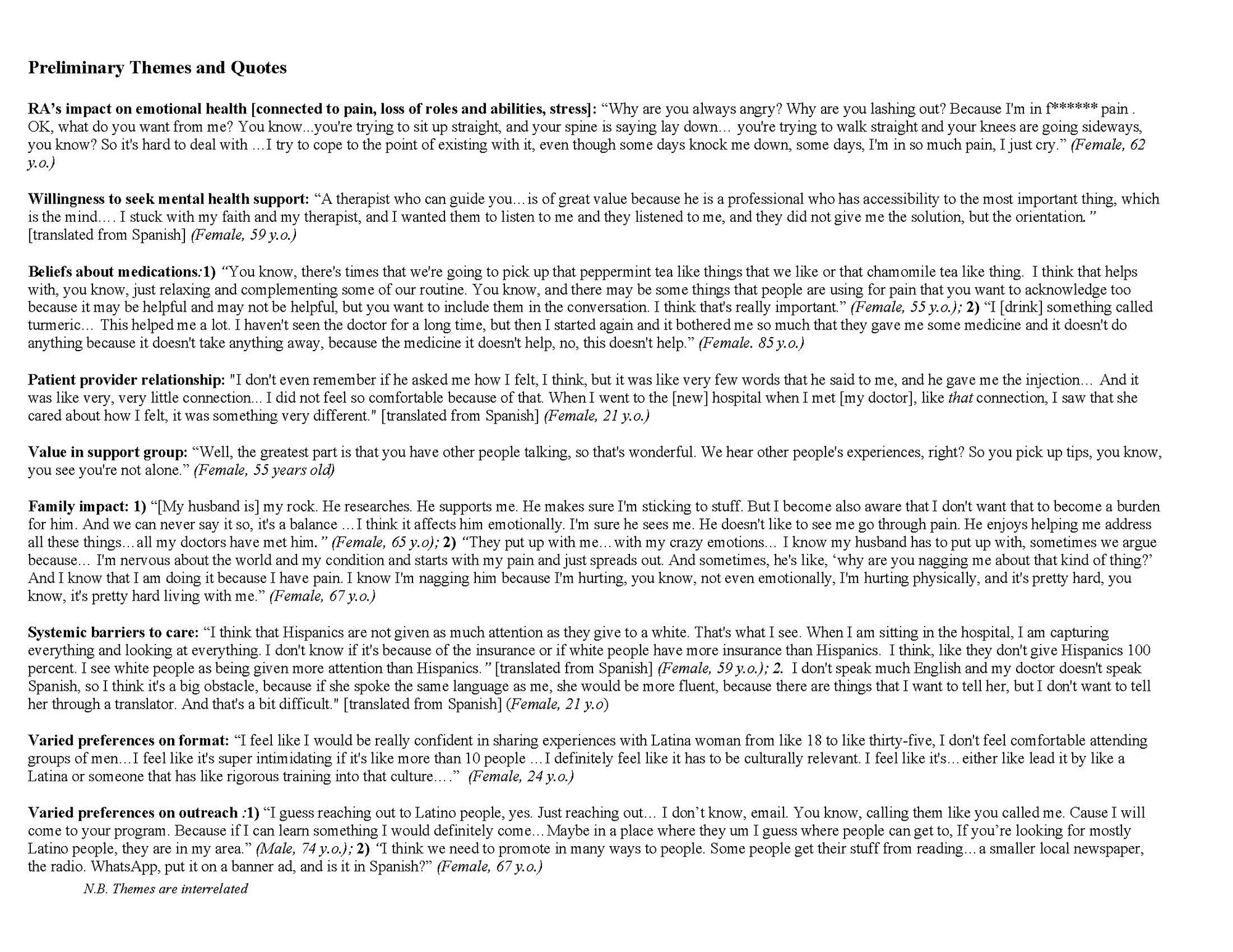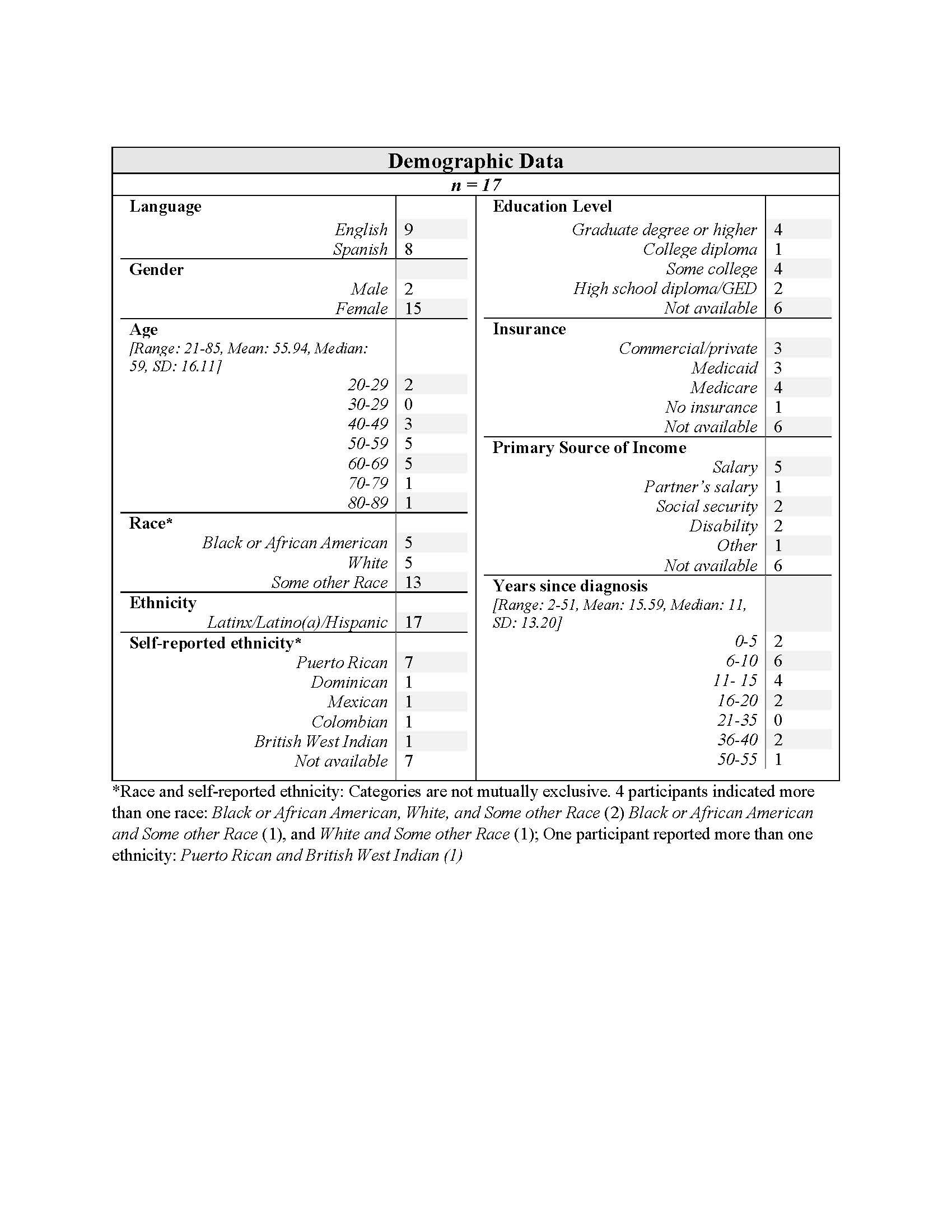Session Information
Session Type: Poster Session A
Session Time: 1:00PM-3:00PM
Background/Purpose: Health disparities for Latinx RA patients, including higher pain, fatigue, disability, and risk for depression are well documented.1, 2, 3, 4 Support and education programs have been shown to enhance self-management and coping efforts of people with rheumatic disease. 5, 6 To address disparities, researchers call for interventions that are culturally tailored to meet the needs of this community. 7, 8, 9
Well-studied self-management programs have been adapted for Latinx populations. 10, 11 Aligned with OMERACT’s call to incorporate the patient perspective in all stages of program development12, our aim is to identify unique education and support needs, as defined by Latinx RA patients, as there is a gap in the literature in this area. This input will be integrated into critical elements of an intervention, including culturally tailored content areas, implementation, and outreach strategies.
Methods: In a mixed methods qualitative study, a licensed bilingual social work (SW) researcher conducted semi-structured interviews with MD-diagnosed Latinx RA patients (18+ years). Interviews were conducted via Zoom in patients’ preferred language, averaged 1.5 hours in length, and were recorded and transcribed verbatim. Participants were recruited from a NYC academic hospital, by MDs and SWs.
Using thematic analysis and NVivo Software, 3 reviewers conducted preliminary analysis of data to identify emerging themes.
Validated scales in English and Spanish, including mHAQ, illness and medication beliefs (IPQ, BMQ), depression (PHQ-8), and self-efficacy (SEMCD), were administered and will be included in future analysis.
Results: To date, 17 Latinx RA patients (8 Spanish-speaking, 9 English-speaking) have participated. (Table 1: Demographics). Recruitment is ongoing. Preliminary results have revealed 9 emerging themes. These themes are interrelated, and include: RA’s impact on emotional health (connected to pain, feelings of loss about roles and abilities, and stress); willingness to seek mental health care; medication and illness beliefs affecting patients’ approach to RA management; essential features of a good patient-provider relationship (trust, feeling cared for and heard, kindness, and consistency); value of participating in a support group (sharing, connection, and feeling less alone); impact on family (relationship dynamics, presence/absence of support); patient experience of systemic barriers to care; varied preferences on structure and format (group size, facilitator attributes, in-person or virtual), and varied preferences on outreach strategies (postal mail, referral source, phone calls, emails, and social media). (Table 2: Preliminary Themes and Quotes).
Conclusion: Preliminary findings are consistent with Latinx culturally relevant concepts such as familismo, confianza, personalismo and respeto,13 and will be used as a framework for content and implementation of this program.
Possible limitations: During COVID-19, interviews have been conducted via phone or Zoom, limiting inclusion of those without access to or facility with these technologies.
To cite this abstract in AMA style:
Balakrishnan A, Batterman A, Hernandez D, Tapia A, Westreich J, Horton R, Fields T. Patient Perspective of Unique Support and Education Needs of Latinx/Latino(a)/Hispanic Rheumatoid Arthritis Patients: Implications for a Culturally Tailored and Disease Specific Intervention [abstract]. Arthritis Rheumatol. 2022; 74 (suppl 9). https://acrabstracts.org/abstract/patient-perspective-of-unique-support-and-education-needs-of-latinx-latinoa-hispanic-rheumatoid-arthritis-patients-implications-for-a-culturally-tailored-and-disease-specific-intervention/. Accessed .« Back to ACR Convergence 2022
ACR Meeting Abstracts - https://acrabstracts.org/abstract/patient-perspective-of-unique-support-and-education-needs-of-latinx-latinoa-hispanic-rheumatoid-arthritis-patients-implications-for-a-culturally-tailored-and-disease-specific-intervention/



